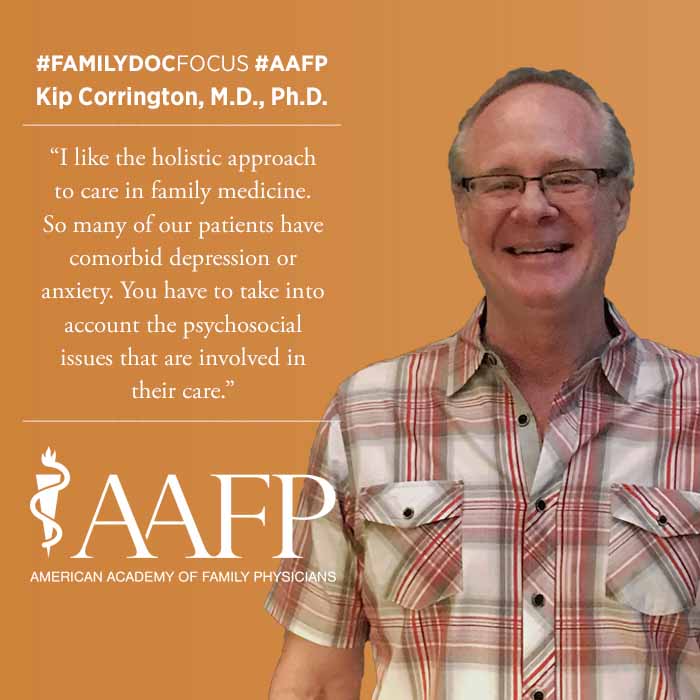In NFL and in Clinic, This FP Knows Teamwork Counts
October 28, 2019 12:00 pm David Mitchell – At the pinnacle of his football career, Kip Corrington, M.D., Ph.D., made an interception in a 1990 AFC Championship game that was seen by more than 76,000 fans at Denver's Mile High Stadium and a national television audience. Denver's victory against Cleveland propelled Corrington and his Bronco teammates to Super Bowl XXIV.
These days, the family physician's career highlights are more subtle, yet deeply meaningful.
"When I feel like I've made an impact on someone's life and really connected with that patient, that really energizes me," he said.
Corrington grew up in College Station, Texas, and stayed home to attend Texas A&M. An All-Southwest Conference defensive back, he helped the Aggies win three consecutive SWC titles and two Cotton Bowls.
He spent a year on Denver's practice squad in 1988 before becoming a regular in the Broncos' secondary in 1989 and 1990. But after suffering a high ankle sprain in the 1991 preseason, Corrington -- who already had suffered multiple knee and shoulder injuries -- decided to move on from the NFL.
"I'd been beaten up pretty well at that point, and I didn't run as well," he said. "That's part of the game, unfortunately."
Corrington, a three-time Academic All-American as an undergraduate, went back to A&M at age 26. He earned a doctorate in psychology but decided to continue his education.
"I grew up in a college town and thought being a professor was the way I'd go," he said, "but research didn't have enough human interaction."

He also didn't relish the idea of competing for grants or worrying about tenure. Instead, he went to medical school and found the human connection he longed for in family medicine.
Corrington, who finished his education and training at age 37, said his background in psychology has helped him in primary care.
"I like the holistic approach to care in family medicine," he said. "So many of our patients have comorbid depression or anxiety. You have to take into account the psychosocial issues that are involved in their care."
After completing his training at the Cone Health Family Medicine Residency in Greensboro, N.C., Corrington stayed in North Carolina and spent a decade in a hybrid model that combined primary care and urgent care. He said the volume of procedures he performed in the urgent care setting prepared him well for his current role in a rural family medicine practice.
Corrington still lives in Greensboro, which has a population of more than 290,000, but he practices about 20 minutes away in much smaller Oak Ridge, which has a population of about 7,000.
"I love it," he said. "You develop deeper relations with the people you see in this environment."
Corrington is the medical director -- and the only physician -- in a practice that also includes two nurse practitioners, a physician assistant and five medical assistants, as well as clerical and administrative staff. He said his experience in football helped him develop leadership and teamwork skills that are applicable in medicine.
"You spend a lot of time at work," he said. "It's good to have a team that's on board with the same philosophy and a positive attitude because not only does that affect your work, but the patients feel it, too."